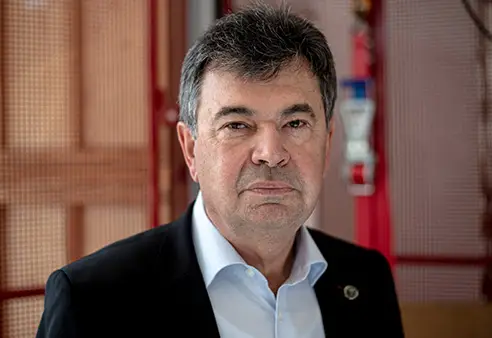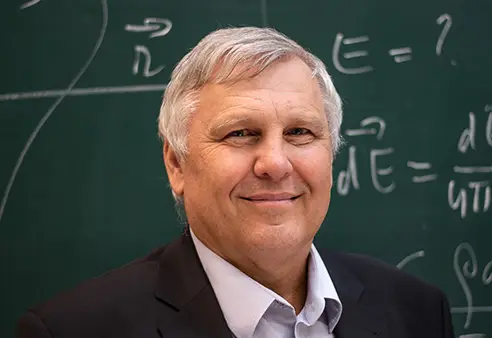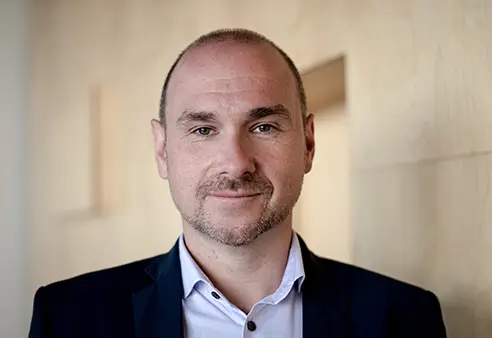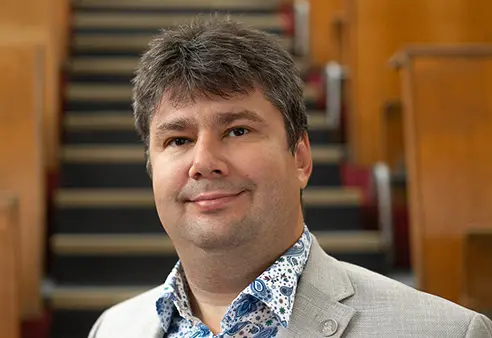The peculiar characteristic of nanoporous materials is that, despite their low weight, they have a huge surface structure, up to several thousand square meters per gram. It's like cramming a football pitch into a sugar cube. These materials have great practical use, says prof. RNDr. Vladimir Zelenak, DrSc. from the Department of Inorganic Chemistry, Faculty of Science, Pavel Jozef Šafárik University in Košice, who specializes in the research of ordered nanoporous materials.
Porous materials are commonly used in practice as filters, insulators, catalysts or absorbents. However, in the case of porous materials, if we go into the nanoworld, their porous structure with cavities of 10-9 meters causes them to have a huge surface area and low specific weight, which makes them excellent "sponges" that can absorb various types of molecules of other substances.
"One of the areas I focus on is the use of nanoporous materials in separation and storage of technical gases such as carbon dioxide, hydrogen and methane. They can absorb huge amounts of these gases and, if necessary, release them back," Vladimír Zeleňák describes their benefits. Even though it is only the basic research at the moment, Zeleňák’s team is already starting to work on turning these findings into practice.
One of the most promising areas of use for nanoporous materials is hydrogen technology, more precisely, containers in which large amounts of hydrogen can be stored. If the pressure vessel is filled with a nanoporous material, it can hold ten or more times the volume of gas than a standard pressure vessel, which is empty, without the nanoporous material. Another promising area of application of nanoporous materials is the storage of drugs and their subsequent release on the basis of a physical or chemical stimulus, which has a huge potential, for example, in the targeted treatment of cancer. Then the advantage of the fact that healthy and tumour cells differ in pH can be used. Cytostatics embedded in a nanoporous material will only be released upon contact with lower pH tumour cells without damaging the healthy cells.
Vladimír Zeleňák emphasises that the level of knowledge is evolving rapidly in the current fast-changing times, so, university professors who educate future experts must be continuously educated and be in touch with the latest scientific findings. According to him, research is the best way to achieve this. "In my case, the ratio of pedagogical and scientific activity is balanced out. I try to implement the results of my research into my teaching practice. For example, when I teach about hydrogen, I always like to mention hydrogen technologies, i.e. the ways of its separation, storage and use, which I deal with in my scientific research work. If a student is interested in the topic, he/she can come to our laboratory and get more information. In this way, through science, a professor can increase students' interest in the field they are studying," emphasizes Vladimír Zeleňák.
Coming from a family of educators, he was originally also studying to become a high school teacher. This changed while he was doing his diploma thesis, that was more of scientific than pedagogical nature, when he began to develop an interest in a career of a scientist. He remained at the university, where he has been working for almost three decades. He has undergone all forms of teaching and for seven years served as a vice-dean. He introduced several new subjects at the faculty and innovated others in line with the demands of the market. In his career of a university professor, the two areas that shaped his life finally got together. As he adds, one must do science with the knowledge that success and results may not come immediately. Usually, the road to knowledge is long and winding.
"It is very difficult to adapt the content and form of education to the fast-changing times," says Vladimír Zeleňák. "Even though I introduce new methods into teaching, I am a conservative type of teacher. Maybe it comes from the fact that I’m teaching future educators. I put a focus on the fact that students should be able to express themselves and have their own opinions, which is why I prefer oral exams.’’ Although young people today read less and receive information mainly from online sources, according to Vladimír Zeleňák, there are certain lessons they simply have to put in their heads. Not everything taught in chemistry is exciting. The Schrödinger equation and thermodynamics simply need to be crammed in.



